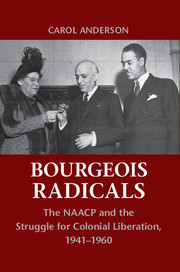Book contents
- Frontmatter
- Dedication
- Contents
- List of Figures
- Acknowledgments
- Introduction De-Centering Du Bois
- 1 Rising Wind
- 2 “The White Man’s Burden Has Not Been Very Heavy”
- 3 “An Even Larger Issue Than ‘Containing Communism’”
- 4 So Weak, So Seventeenth Century
- 5 Regime Change
- Conclusion Beyond the Single Story
- Bibliography
- Index
- References
5 - Regime Change
Published online by Cambridge University Press: 05 December 2014
- Frontmatter
- Dedication
- Contents
- List of Figures
- Acknowledgments
- Introduction De-Centering Du Bois
- 1 Rising Wind
- 2 “The White Man’s Burden Has Not Been Very Heavy”
- 3 “An Even Larger Issue Than ‘Containing Communism’”
- 4 So Weak, So Seventeenth Century
- 5 Regime Change
- Conclusion Beyond the Single Story
- Bibliography
- Index
- References
Summary
We demand that in other parts of British Africa [such as Kenya] no white minority be given privilege to rule over native majorities; that education for citizenship and work be undertaken for all native peoples and that the longstanding promise to admit native Africans to equal status with other citizens in the British Empire be implemented.
– NAACP Colonial Conference, 1945The war for full colonial liberation was far from over. In fact, it was far from won. The indigenous freedom fighters and their allies, including the NAACP, had begun to shake the pillars that propped up the white man’s burden; but shaking and collapsing are two different things. The French, for example, continued to claim that Tunisia and Morocco were integral parts of France and, regardless of what happened in Indonesia, held fast to the concept of domestic jurisdiction. The British response to an epic insurgency in Kenya rose to a shocking level of brutality and seemed to only further entrench settler colonialism. Economic devastation in Africa, Asia, and the Caribbean demanded an investment at a magnitude that no one was willing to make. Worse still, international agreement on human rights, which the NAACP deemed essential for real freedom, was ensnared in the Cold War, Jim Crow, and colonialism and, thus, stalled at the UN.
In addition, over the course of the 1950s, the Association would face a series of challenges that made its job of helping destroy colonialism nearly impossible. Raging conflicts within the organization crescendoed at the very moment when the NAACP had to maneuver against a new regime in the White House that was openly hostile and blocked access to policy makers; the UN was under siege from red-baiting American politicians; and U.S. national security paradigm diverted American economic aid into military hardware and strategic mineral extraction. As a result, the next wave of anticolonial work became a haphazard journey to a decolonized but certainly not independent Third World.
- Type
- Chapter
- Information
- Bourgeois RadicalsThe NAACP and the Struggle for Colonial Liberation, 1941–1960, pp. 268 - 329Publisher: Cambridge University PressPrint publication year: 2014



